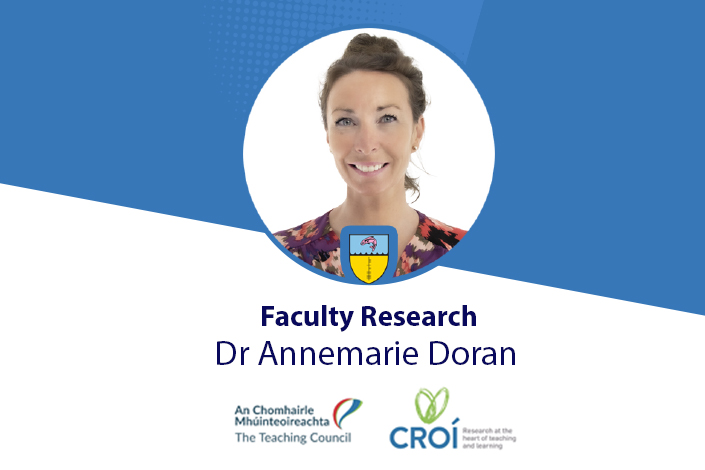Dr Annemarie Doran, Lecturer in Education and a member of our Post-Primary Programme Team, completed her research project on teacher wellbeing. It has been supported by and is being promoted by The Teaching Council. Her project is available free of charge online to registered teachers and has been supported by The Teaching Council’s Collaboration and Research for Ongoing Innovation (CROĺ) Research Series.

The Teaching Council launched the comprehensive research series to promote a wider understanding of the research that teachers do to support innovation in teaching and learning. The CROĺ Research Series encourages teachers’ engagement with research and provides support to teachers who undertake research. Dr Doran was awarded funding under the John Coolahan Research Support Framework of The Teaching Council for this particular project.
Post-Primary Teacher Wellbeing in Ireland
Dr Doran teaches in the PME in Post-Primary Education programme. Her recent project is titled An exploration of how teacher wellbeing is conceptualised and supported by the main stakeholders in post-primary schools in Ireland. It focused on the gap in research on teacher wellbeing and how it is conceptualised and supported by ‘three voices’ — the managerial agencies, principals/deputy principals and teachers — in post-primary schools in Ireland. It used an interpretivist approach, which was underpinned by dialectical pluralism.
Teachers’ and School Leaders’ Views of Wellbeing
Phase One of Dr Doran’s project used an online survey to investigate if there were differences in opinion in how teachers and school leaders viewed wellbeing in relation to:
• Policy
• Management caring about them
• Its inclusion on meeting agendas
• The support strategies in place
• Wellbeing-related continuous professional development
It also examined how much of the variance in wellbeing scores could be explained by the same variables, after controlling for age. The data showed statistically significant differences, with principals/deputy principals scoring higher overall wellbeing than teachers. The Mental Health Continuum Short Form (MHC-SF) was used, with results showing that having a wellbeing policy and/or reinforcing it did not make a difference to teachers’ personal wellbeing. The difference in participants’ wellbeing scores was due to support strategies for teachers and the attitude of school management to teachers.
Accountability, Visibility and Perceptions of Wellbeing
Dr Doran used seven interviews and a focus group (six participants) in Phase Two to gather further data, which she analysed thematically to determine the key findings. Three main themes emerged: accountability, visibility and perceptions. Her analysis showed that an emphasis on student wellbeing adversely affected the wellbeing of teachers as they felt left behind.
The results indicated that while extensive circulars and guidelines have been issued, there is evidence of inadequate provision for teacher wellbeing in the Wellbeing Framework. While the focus on wellbeing has created more awareness of wellbeing among teachers, the evidence of supports for them is lacking. Dr Doran concluded that there is more work required at policy level for this to be effective. She also defined the need for a collaborative approach to the establishment of a definition of teachers’ wellbeing for schools.
We commend Dr Doran’s systematic inquiry and analysis, and we support her call to support teachers’ wellbeing. With the support of The Teaching Council, this valuable research will reach teachers and school leaders and contribute to an improved scaffolding of support for teachers.